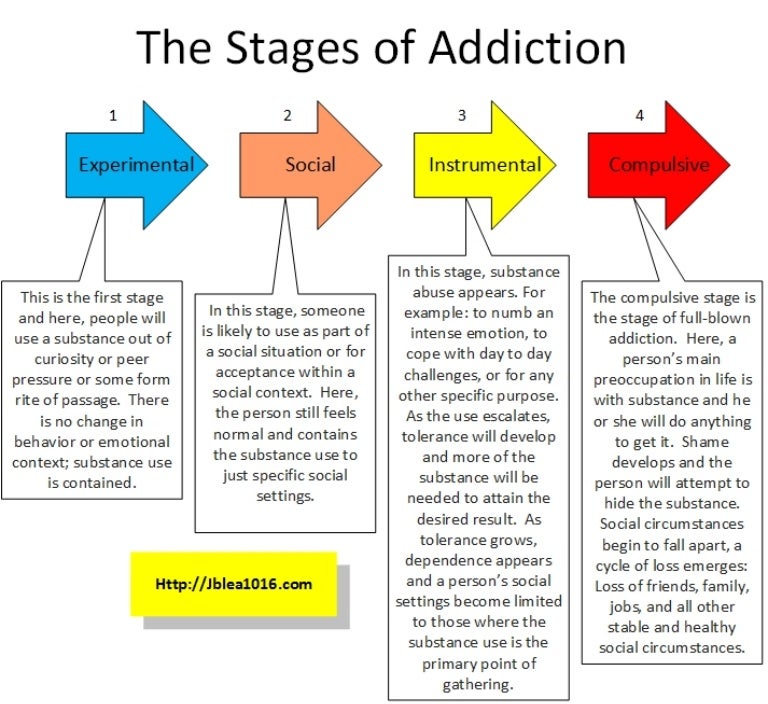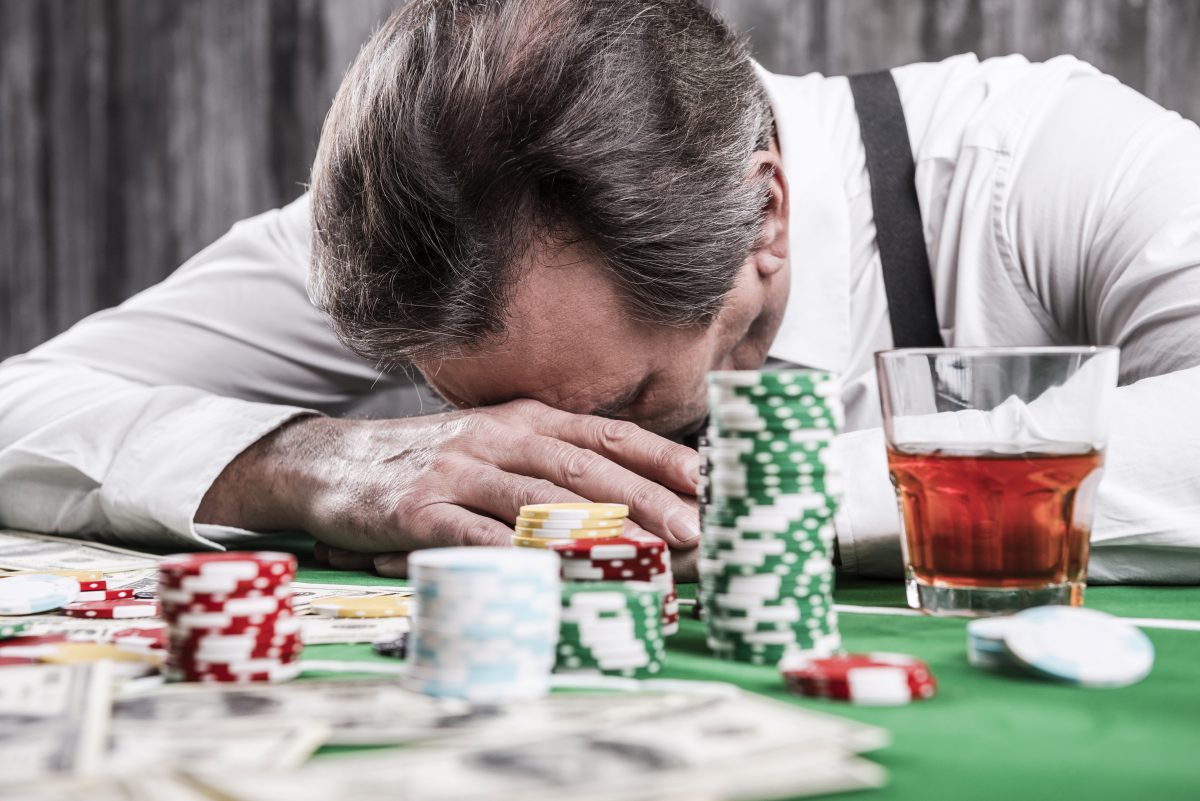Stages Of Gambling Addiction
Gambling Addiction Stages Gambling addicts continue to gamble in spite of the adverse effects of their gambling activities on their work, college, career, personal relationships, and finances. They lose their ability to manage their money, as a result of which their unpaid bills and debts pile up, making them feel worse than ever. An addiction to gambling doesn’t happen overnight. The rate of progression varies greatly, and certain types of gamblers (mostly those playing 'skill' type games of chance) may gamble for years or even decades before becoming pathological in their addiction.
- Practice
At this stage of my gambling “career” I still had control over my gambling behavior. I religiously kept to self-imposed limits on the amounts I would spend for gambling, using only money I could afford to lose, and never any more, even if I happened to lose my stake on the very first hand of the night. The addiction takes hold once more and the individual re-enters the pre-contemplative stage; Not all compulsive gamblers will go through every stage and they may not enter them in this particular order however, what is consistent within addiction recovery of any kind is the power of conscious decision making. Gambling addiction has the potential to cause irreparable damage if ignored. Here are the 5 stages of gambling addiction.
March is Problem Gambling Awareness Month. If someone you know is struggling with a gambling addiction, these intervention methods can be the first step toward recovery.
While research indicates that most adults who choose to gamble can do so responsibly, theNational Council on Problem Gambling estimates that one percent of adults in the United States meet the criteria for pathological gambling. An additional two to three percent are considered problem gamblers.
Identifying the signs of gambling addiction can be the critical first step to getting help.
What Signs Should I Look For?
As with many addictions, gambling is considered a problem when the behavior patterns become destructive to personal and family relationships as well as job and career goals. The key indicators are:
Gambling Addiction Help
- An increasing preoccupation with gambling
- A growing need to bet higher amounts of money and to bet more often
- A restlessness or irritability when trying to quit
- Chasing losses
- The inability to stop gambling even when there are serious negative consequences
What is an Intervention?
An intervention, at its core, is a gentle but firm confrontation. Loved ones communicate how much they care, but also how much harm has been caused by the gambling behavior, with clear, concrete examples of what needs to change. Interventions require careful planning and are often undertaken with the help of an LCSW or licensed interventionist.
When confronting your loved one, it is important to provide specific examples of the damaging effects that their gambling problems have had on the lives of their family and friends. Present a prearranged treatment plan with very clear goals and guidelines, spelling out the consequences if your loved one refuses treatment.

How Does An Effective Intervention Work?
There are four general stages when conducting an intervention: validation, documentation, recommendation and consequences.
1) Validation
Create a safe and caring environment for the intervention. It is important to recognize that while you may be harboring feelings of anger because of your loved one’s behavior, the intervention has greater chances of success if you come from a place of compassion, concern and love.
Help your loved one to understand that you see them as more than just their gambling problem. Offer them specific examples of their positive traits and why you care enough about them to confront their damaging behaviors.
2) Documentation
A person struggling with an addiction will likely deny or downplay the severity of their issues. However, when faced with specific instances from multiple people, they are no longer able to maintain that denial.
It is important to offer specific examples that you have personally experienced or observed when interacting with your loved one. Provide as many details as you can remember, and then explain how your loved one’s behavior made you feel in those instances.
3) Recommendation
Ask your loved one to take a specific action to combat their gambling problem. This should be a prearranged plan that you have developed with the other participants in the intervention.
Examples of recommendations could include: attending Gamblers’ Anonymous, seeing a therapist who specializes in gambling addiction or agreeing to involve a third party in money management. A licensed interventionist will be able to help you come up with recommendations tailored specifically to your loved one’s situation.
4) Consequences
Help your loved one to realize that legitimate action must be taken. Explain that if they do not follow the recommendations in Step 3, there will be very real consequences. Be specific about what you will or will not do if they refuse to cooperate, and be prepared to follow through on what you say. Otherwise, the intervention will be ineffective.
This conversation can be difficult and uncomfortable for all involved, but an hour of discomfort is well worth the long-term health and happiness of your loved one. Open dialogue can help the person you love begin to move toward healing and recovery.
To reference the work of our faculty online, we ask that you directly quote their work where possible and attribute it to 'FACULTY NAME, a professor in the USC Suzanne Dworak-Peck School of Social Work” (LINK: https://dworakpeck.usc.edu)
Gambling is one of the most popular pastimes all over the world. People who have attained the age of being a legal adult are qualified to take part in gambling activities of their choice. Although a lot of gambling activities are legally accepted and regulated, many other forms of gambling are still illegal. One must be aware of these things before stepping into the realm of gambling. Apart from the serious stuff, gambling is an interesting activity which can be quite rewarding if done right.
은꼴, 야짤 Gambling requires betting a certain amount of money or anything that holds some monetary value on the outcome of a game. If the odds are in your favor, you are most likely to win the bet. Gambling outcomes are dependent on luck or chances of you winning, which cannot be predicted or calculated accurately. In some gambling events, the outcome depends upon the skill of the players, like in sports betting. Once you get the hang of it, gambling can be a fun activity. We often tend to indulge in fun activities in our free time, but when these habits get out of control it becomes a problem for the person.
Dr. R. L. Custer was an American psychiatrist, who was the chief of treatment services of mental health and behavioral science service of the US Veterans Administration. He is considered to be the first to identify gambling addiction and seen as the pioneer for treating gambling addiction. He established the first treatment center for compulsive gamblers in Ohio. He identified pathological gambling as a treatable illness in the 1970s. Due to his efforts, pathological gambling was listed as a psychiatric disorder in 1980.
Being the first to recognize this problem, he identified the stages in which the gambling addiction progresses. The three phases are: winning phase, losing phase, and desperation phase.
Stages Of Gambling Addiction
Winning Phase

This is the stage where the gambler has had wins in multiple gambling games which leaves them with unusually high hopes of winning in the future. They are left with an unreasonable optimism that they will keep on winning even in future games. Due to frequent wins at gambling, they start loving it with the belief that they will never run out of luck and only win. They keep bidding more and more and are quite confident.
Losing Phase
Inevitably, the gambler loses some or most of his bets in the coming time. They get addicted to gambling and start isolating themselves from their family. The losses do not sit well with the gambler and they start bidding more and more money by borrowing it from friends and family or through illegal means. Their debts keep piling on, thereby affecting their lives severely. They continue gambling with the hope of starting a winning streak again.
Desperation Phase
This phase occurs when the gambler starts indulging in gambling more and more and starts alienating their family and friends. They are so engrossed in gambling that nothing else matters to them anymore and they start blaming the people around them for their own problems. Such people are prone to substance abuse.